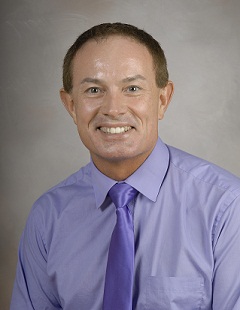John P. Higgins: Mandatory ECG Screening Could Save Young Athletes’ Lives

Sudden cardiac death is the No. 1 medical killer of our young student athletes under the age of 24. In just the past two weeks, there have been at least three cases of fatal or near-fatal heart-related events involving Texas high school and middle school students. It’s time that we not only recognize there is a problem but do something about it.
The University Interscholastic League has not updated its standard physical in at least 20 years. The antiquated practice of relying solely on pre-athletic participation history and a limited physical exam is not enough.
That’s why some students, parents, cardiologists and school administrators have banded together to advocate for the passage of House Bill 767, a bipartisan bill that would mandate that the UIL include an electrocardiogram screening as part of its standard pre-participation physical.
An ECG is a noninvasive electrical tracing of the heart, which can reveal underlying conditions associated with sudden cardiac death. Throughout the world, large organizations recommend ECG screening for all athletes. Closer to home, our state’s flagship universities require ECG screenings for all athletes, and over 100 Texas school districts have developed their own programs.
Opponents of uniform heart screenings as a part of the standard physical exam cite the opposition of the American College of Cardiology and the American Heart Association. In fact, the heart association has no stated position on HB 767 and has chosen to remain neutral. While the ACC has been vocal against the measure, a significant number of members disagree, including me.
If fact, in its December 2014 annual report, the Texas Chapter of ACC publicly stated that heart screenings save lives, and it backed up the claim by giving significant resources in the way of time, talent and money to a nonprofit whose sole intent is to screen children throughout the state.
The same individuals question the necessity, cost and the feasibility of large-scale ECG screenings. Here are some key points to consider in answer to such questions:
Why not stick with the history and physical? Unfortunately, most of the items on the current checklist are nonspecific. The history and physical exam, even when administered by an expert, in detail and under ideal conditions, is just not sufficient.
Whom to screen? Athletes. They are at higher risk for sudden cardiac death due to the fact that many underlying, associated conditions will cause their collapse under stressful situations such as high-intensity sports.
Isn’t this like trying to find a needle in a haystack? ECG screenings will detect about 1 child that has a major underlying cardiovascular problem in every 200 screened. Some of these problems are the type that can cause sudden cardiac death right away; others can cause chronic problems when the child is older. Most important, many of the conditions that are associated with sudden cardiac death are inherited in a 50-50 manner, so identifying one person could save others in their family. In this way, the numbers of lives affected add up to a significant number.
How reliable is an ECG screening? The success of an ECG screening for detecting most conditions associated with sudden cardiac death is very high. While it is not perfect, it is nearly 10 times more accurate than a history and physical exam.
What about false positives? Like any test, false positives happen due to physiological variations in athletes’ hearts that will affect the electrical signals on the ECG. However, most cases of these false positives can be clarified with a single additional test (such as a limited echocardiogram) and a doctor’s visit, at an affordable cost. Further, false positives are higher with the routine history and physical.
What about the cost? The ECG is an affordable, noninvasive test and takes about 5 minutes. The costs vary, but most school associated screenings are offered for $15 or less, which includes interpretation from a cardiologist. Many institutions offer free screenings.
Do we have the infrastructure to do it? Yes. Given the widespread availability of machines in most medical facilities and the ability for remote reading of the ECGs, this should not be a problem.
If we make no changes now, our children will continue to die. Based on the preponderance of evidence, the ECG is a reasonable first step in tackling this problem. Right now, there is no alternative other than doing nothing and allowing our children to become another case study.
Cardiologist John P. Higgins is associate professor of medicine at the University of Texas Health Science Center in Houston. He also works as a sports cardiologist for Rice University Athletics and the Houston Rockets. Reach him at John.P.Higgins@uth.thm.edu.
Story Credit: http://www.dallasnews.com/opinion/commentary/2015/05/14/john-p.-higgins-mandatory-ecg-screening-could-save-young-athletes-lives


